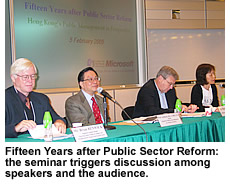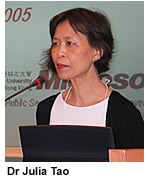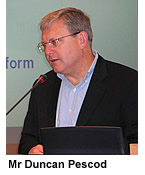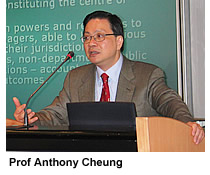A thought-provoking discussion on public sector reform
The seminar was co-organized by CityU’s Governance in Asia Research Centre (GARC) and the Hong Kong Government's Efficiency Unit. Speaking at the opening ceremony, Dr Julia Tao, Director of the GARC, said: “The seminar provides a very timely and important
discussion which is regarded as the top priority in today’s Government policy-making.” Dr Tao thanked the Efficiency Unit for working with CityU. “It is very important for an academic institution to collaborate with Government agencies in order to reach out and utilize our assets for the benefit of the community,” she said.
Since 1989, the
“Where are we today? We should ask ourselves the question: how to do more and to do things differently,” said Mr Duncan Pescod, Head of the Efficiency Unit. Mr Pescod set the scene by reviewing Government reforms from the 1950s to the present, with thorough discussion of the numerous new initiatives from the 1990s and the role of the Efficiency Unit, set up in 1992, in helping the continuous improvement of service delivery and management. Topics, including meeting performance pledges, E-government initiatives, and outsourcing, among others, were discussed as ways and means for an effective workforce to help fulfill the Government’s vision of making Hong Kong "Asia’s world city".
Professor Anthony Cheung, of CityU's Department of Public and Social Administration and Associate Director of GARC, gave a very critical and comparative analysis on the New Public Management tools employed for the major public sector reforms in
Adding insights to the topic from different perspectives, presentations were given by renowned speakers: Mr Brian Renwick, Manpower Committee Member of the Hong Kong General Chamber of Commerce and Managing Director of Boyden Global Executive Search; Professor Pan Suk Kim, Professor of Public Administration, Yonsei University and also former Secretary to the President for Personnel Policy, Office of the President, Korea; Professor Robert Gregory, Associate Professor of Public Policy and Administration, Victoria University of Wellington, New Zealand; and Professor Martin Painter, of CityU's Department of Public and Social Administration.
In step with CityU's tradition of making its resources available to serve the community, the seminar was the third in the Microsoft Public Seminar Series on Good Governance organized by the GARC. The Centre was established in 1999 as a Research Centre of the Faculty of Humanities and Social Sciences and was renamed the GARC in 2002 to embrace a broader agenda for the comparative study of institutions, policies and ethics of governance in



